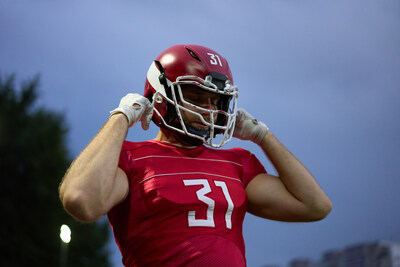Researchers Find Facemask Impacts are Leading Source of Higher Severity Impacts in Professional American Football
PR Newswire
STOCKHOLM, Sept. 11, 2024
Facemasks accounted for over half of the top 10% of head impacts experienced by players in the study, highlighting the importance of prioritizing new helmet designs
STOCKHOLM, Sept. 11, 2024 /PRNewswire/ -- Nearly one third of concussions in professional American football are due to impacts from the facemask, a part of the helmet that has remained mostly unchanged in the last decade. In a new study presented at the International Research Council on Biomechanics of Injury conference today, researchers used data collected from instrumented mouthpieces worn by players in the National Football League (NFL) that measured head motion and found that facemasks are the most frequent location of impact on a player's helmet in a subset of high severity impacts. The study findings suggest that facemask enhancements could help protect players and minimize injury risk.
In recent years, there has been a concerted effort to reduce the number of concussions sustained by professional American football players, with one important strategy involving engineering research to redesign helmets to better protect these athletes. By integrating new equipment into a broader strategy that includes improved play techniques, new rules and better education, there was a 23% reduction in concussions from the 2015-2017 seasons to the 2018-2019 season. However, concussions still occur, and almost all concussions involve direct contact to a player's helmet. Further, there is a secondary goal to reduce high severity head impacts, irrespective of injury, to reduce head impact exposure.
In this study, researchers used instrumented mouthpieces among select teams in the NFL to objectively measure the kinematics of head impacts they sustain during play. The data from these sensors, along with player tracking data and detailed video review to obtain contextual information for the impacts, allowed the researchers to create a unique integrated data set that summarized these scenarios.
"Our field has rapidly improved research tools and approaches, allowing us to produce the data to advance equipment, rules of the game and player technique in ways that have been shown to reduce concussion among professional athletes," said Kristy Arbogast, PhD, scientific director of the Center for Injury Research and Prevention and Co-Director of Minds Matter Concussion Program at CHOP and first author of this study. "These findings, based on instrumented mouthpieces, suggest that facemask redesign should be the focus of future innovation that can continue to improve the safety of football players at all skill levels."
The data were collected during the 2019-2022 NFL seasons, during which 98 players were equipped with instrumented mouthpieces that measured the six degrees-of-freedom head kinematics, which consist of three translational and three rotational accelerations. A total of 5,104 head acceleration events were collected during this period. The researchers focused on the most severe (above the 90th percentile) head acceleration events.
The study found that facemask impacts represented 59% of the impacts in this most severe dataset, with the proportion varying between player positions. Impacts to the facemask were most common among linemen (66%), followed by hybrid players (56%) and speed players (46%). Facemask impacts to lineman were particularly prominent in this dataset when considering angular motion of the head, which is thought to be causal in the mechanism of brain injury. The facemask impacts were primarily due to contact with the helmet shell of the other player involved in the collision. For speed players, however, the proportion of facemask impacts attributed to impact to the helmet shell of the opposing player was lower, offset by increased impacts to the shoulder of the opposing player.
"The sophisticated and specific data collection from sensor technologies like instrumented mouthguards are providing a deeper understanding about the nature of impacts players experience on the field," Allen Sills, MD, the NFL's Chief Medical Officer. "This information is helping us to develop more effective interventions to reduce the frequency and severity head impacts and keep players healthy."
"This study underscores the importance of using data and ongoing research efforts to continually self-assess and innovate as our research identifies new approaches that may help make the game safer not just for our professional athletes but ultimately for how the game is played at all levels," said Thom Mayer, MD, Medical Director of the NFL Players Association.
This study was supported by Football Research, Inc., the NFL and the NFL Players Association (NFLPA) through joint contribution to research.
Arbogast et al, "Kinematics of Facemask Impacts in Professional American Football." International Research Council on Biomechanics of Injury. September 2024. Stockholm, Sweden.
About Children's Hospital of Philadelphia:
A non-profit, charitable organization, Children's Hospital of Philadelphia was founded in 1855 as the nation's first pediatric hospital. Through its long-standing commitment to providing exceptional patient care, training new generations of pediatric healthcare professionals, and pioneering major research initiatives, the hospital has fostered many discoveries that have benefited children worldwide. Its pediatric research program is among the largest in the country. The institution has a well-established history of providing advanced pediatric care close to home through its CHOP Care Network, which includes more than 50 primary care practices, specialty care and surgical centers, urgent care centers, and community hospital alliances throughout Pennsylvania and New Jersey, as well as the Middleman Family Pavilion and its dedicated pediatric emergency department in King of Prussia. In addition, its unique family-centered care and public service programs have brought Children's Hospital of Philadelphia recognition as a leading advocate for children and adolescents. For more information, visit https://www.chop.edu.
Contact: Ben Leach
Children's Hospital of Philadelphia
(609) 634-7906
Leachb@email.chop.edu
![]() View original content to download multimedia:https://www.prnewswire.com/news-releases/researchers-find-facemask-impacts-are-leading-source-of-higher-severity-impacts-in-professional-american-football-302245363.html
View original content to download multimedia:https://www.prnewswire.com/news-releases/researchers-find-facemask-impacts-are-leading-source-of-higher-severity-impacts-in-professional-american-football-302245363.html
SOURCE Children's Hospital of Philadelphia



